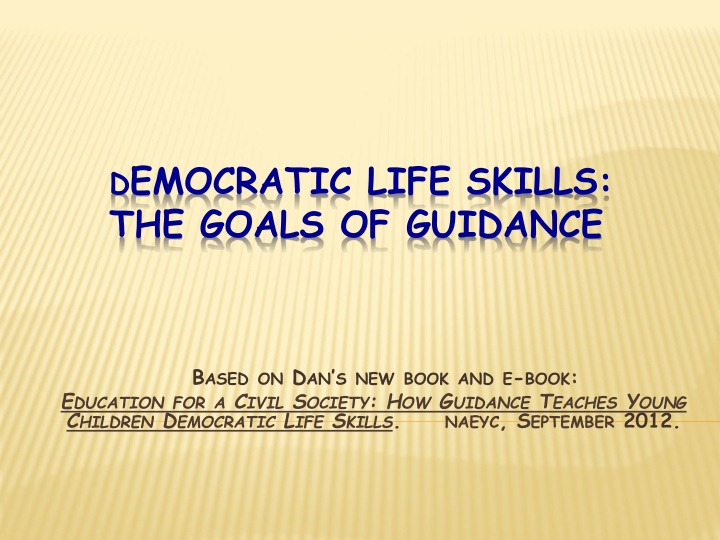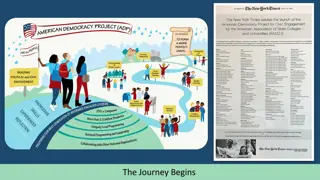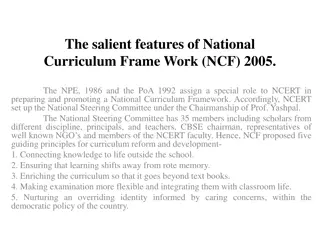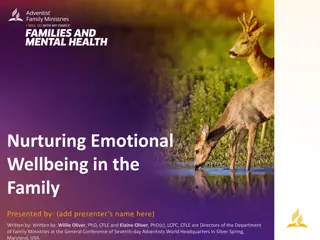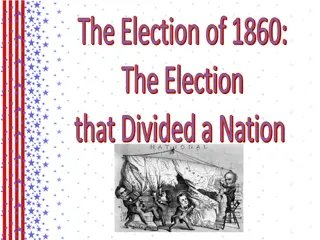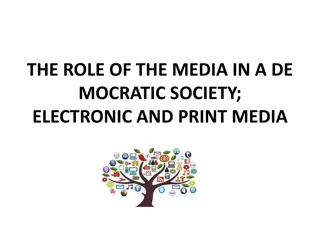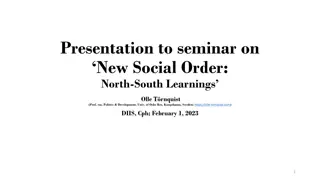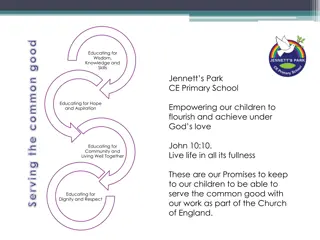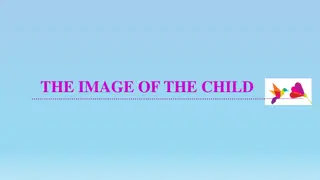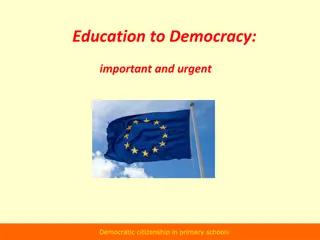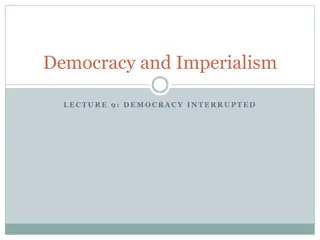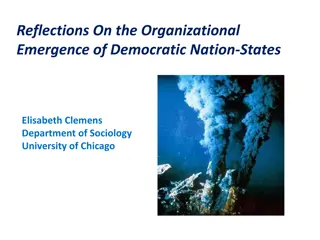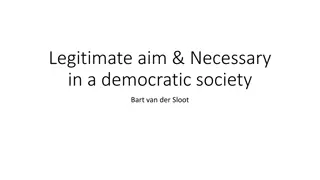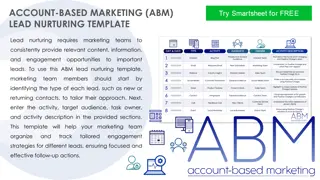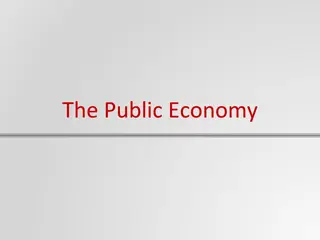Nurturing Democratic Life Skills in Children: A Guide to Promoting Positive Development
Explore the concept of Democratic Life Skills (dLS) and the essential guidance needed to cultivate these skills in young children. Learn about the educational outcomes for a democratic society and the historical and psychological roots of dLS. Discover how to support children in finding acceptance, expressing emotions, solving problems creatively, accepting uniqueness, and thinking intelligently and ethically. Gain insights on reacting to safety needs to help children manage stress effectively.
Download Presentation

Please find below an Image/Link to download the presentation.
The content on the website is provided AS IS for your information and personal use only. It may not be sold, licensed, or shared on other websites without obtaining consent from the author.If you encounter any issues during the download, it is possible that the publisher has removed the file from their server.
You are allowed to download the files provided on this website for personal or commercial use, subject to the condition that they are used lawfully. All files are the property of their respective owners.
The content on the website is provided AS IS for your information and personal use only. It may not be sold, licensed, or shared on other websites without obtaining consent from the author.
E N D
Presentation Transcript
DEMOCRATIC LIFE SKILLS: THE GOALS OF GUIDANCE BASED ON DAN S NEW BOOK AND E-BOOK: EDUCATION FOR A CIVIL SOCIETY: HOW GUIDANCE TEACHES YOUNG CHILDREN DEMOCRATIC LIFE SKILLS. NAEYC, SEPTEMBER 2012.
EDUCATIONAL OUTCOMES FOR A DEMOCRATIC SOCIETY In this age of accountability all things educational seem to need outcomes. The 5 dLS (lower case d) are outcomes for guidance. First let s define the key term, Guidance . Teaching kids to solve their problems rather than punishing them for having problems they haven t yet learned how to solve, and cannot solve on their own. Think of children as months old, not years old. Good teaching in the social/emotional domains. Teaching to sustain a democratic society
WITH A TEACHERS GUIDANCE, THE 5 DLS REFLECT THE CHILD S DEVELOPING ABILITIES TO: 1. Find acceptance as a worthy member of the group and as an individual 2. Express strong emotions in non-hurting ways. 3. Solve problems creatively--independently and in cooperation with others 4. Accept unique human qualities in others. 5. Think intelligently and ethically.
WHERE DID THE dEMOCRATIC LIFE SKILLS COME FROM? PART ONE. Historical roots: Johann Comenius, Friedrich Froebel, Maria Montessori and John Dewey New education: from limited but viable experience of childhood to ever expanding experience of the adult, both sustaining and affirmed by social democracy The cooperative learning community active learning in cooperation with others. (White handout; Dan s book due out in June from NAEYC.)
WHERE DID THE dEMOCRATIC LIFE SKILLS COME FROM? PART TWO: Psychological roots. a.The mid 20thCentury psychologists. Maslow: Safety needs and growth needs. b. The neuroscience of human relationships and stress. c. Intelligences not fixed but develop through human relationships.
SKILLS 1 AND 2: REACTING TO SAFETY NEEDS No such thing as a bad kid, just kids with bad stress. (Kids with high stress levels have conflicts.) Sources of stress are environmental, biological, and often both. Stress levels rise with less than healthy parent-child attachments. Stress causes an overload of the amygdala system in the brain s right hemisphere the fight or flight reaction. Aggression, the most vexing form of stress expression, causes rejection. Rejection in early childhood makes for long term difficulties in school and life. (Columns 2,11-13,16-18,20)
SKILLS 3, 4, & 5: RESPONDING TO GROWTH NEEDS Healthy attachments and self-esteem Progress in healthy brain development Integration of the hemispheres Executive function development, not hyper- stimulated amygdala Willing and able to experience life fully Readiness, a state of mind not a state of knowledge. (Columns 1,2,7,10,14)
CONSIDERING THE LIFE SKILLS Genetic? Temperaments and experience. Clustered hierarchy. Stairsteps (for scaffolding) Authentic assessment to come Young children s development and the higher level skills. The case of Alex and his teachers. (Thanks to EPI, now part of Teaching Strategies.)
THE INDIVIDUAL SKILLS Skill One: Finding acceptance as a member of the group and as a worthy individual Teachers work hard to build relationships with children and family members.
THE INDIVIDUAL SKILLS Skill One: Finding acceptance as a member of the group and as a worthy individual Skill Two: Expressing strong emotions in non-hurting ways Teachers use guidance: are proactive with DAP for all; intervene with guidance talks, conflict mediation, class meetings, & comprehensive guidance.
THE INDIVIDUAL SKILLS Skill One: Finding acceptance as a member of the group and as a worthy individual Skill Two: Expressing strong emotions in non-hurting ways Skill Three: Solving problems creatively--independently and in cooperation with others Teachers emphasize open-ended activities and individual & group problem-solving over set products and teacher solved problems.
THE INDIVIDUAL SKILLS Skill One: Finding acceptance as a member of the group and as a worthy individual Skill Two: Expressing strong emotions in non-hurting ways Skill Three: Solving problems creatively, independently and in cooperation with others Skill Four: Accepting the unique human qualities in others Early Childhood Professionals model and teach acceptance of individuals and inclusion of all in the group.
THE INDIVIDUAL SKILLS Skill One: Finding acceptance as a member of the group and as a worthy individual Skill Two: Expressing strong emotions in non-hurting ways Skill Three: Solving problems creatively, independently and in cooperation with others Skill Four: Accepting the unique human qualities in others Skill Five: Thinking intelligently and ethically Teacher recognizes the difficulty of this task, models and supportively encourages this skill. Recognize that in showing it, children like all of us, including teachers--will make mistakes.
TEACHING THE DLS, WHAT IS NEEDED DAP, including healthy adult-child ratios Guidance Practices consistently used Attachments with children, Partnerships with families Professional staff working together, including administrators Proactive Affirmative action in hiring men teachers Understanding the connection of the child s experience to the life of the adult the child becomes.
